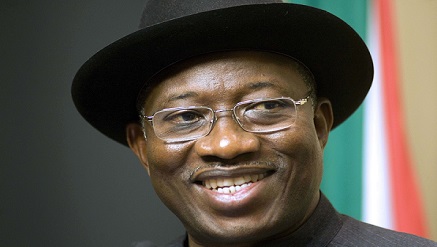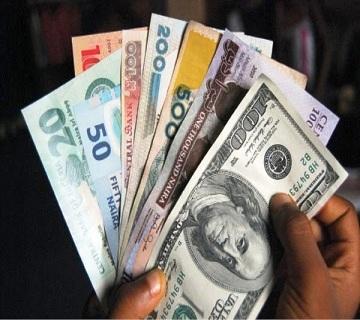General News
How World Powers Plotted Jonathan’s Defeat

President Goodluck Jonathan lost his re-election bid several weeks before the March 28 poll to a web of plots hatched at home and honed abroad, according to the Tribune.
The Tribune said that last-minute contest between forces that wanted him to bow out and those that wanted him to hold out for as long as necessary even when it was evident that the news from the field pointed at a possible defeat.
It was learnt that as of 5.00 p.m. on Tuesday, hawks around the president were still at the Aso Rock Presidential Villa, piling pressure on him not to concede defeat.
Those working on him to concede and bow out, reportedly led by a former Head of State, General Abdulsalami Abubakar, were also said to have stayed put in the same Presidential Villa, persuading him that it was the most honourable way to go since it was clear that figures from the field were not in his favour.
The drama in the Presidential Villa was also said to be closely monitored by combined international forces that had concluded on post-Jonathan presidency, reportedly led by the United States of America and the United Kingdom.
One of those around the president persuading him to stay put was said to be a General in the army from a not-too-core Northern state, reportedly assuring him that the alleged irregularities in the North, underage voters, among other issues, which were beamed live by a national television station and shown on the Cable News Network (CNN) would be enough ground for him to reject the outcome.
The Tribune reported that the president was also allegedly told that he would be making General Muhammadu Buhari and the All Progressives Congress (APC) heroes by conceding to them, because all the good works he had done which were nearing fruition would blossom during their reign and would count as their achievements.
He reportedly told them that no matter how long he stayed in office, he would still leave one day and since crisis was certain to herald his opposition to the outcome, he would be reneging on his promise that no Nigerian blood would be worth his political ambition.
Convinced that it was the way to go, the president reportedly took “his own” by surprise by making the now-famous phone call to Buhari without telling them, although they were present at the president’s abode.
He was also said to have played a fast one on the hawks by making the call before the Independent National Electoral Commission (INEC) announced Buhari as the winner, following his assessment of the figures available to him, while those pressurising him to hang on reportedly thought the concession would be after the announcement by the electoral body as is usually the practice.
The western world, according to available information, keyed into the Buhari presidency project months before the election and the refusal to sell arms to Nigeria to fight the Boko Haram insurgency by Washington was said to be mainly predicated on the likelihood of Jonathan’s administration using same to quell possible civil disobedience if he manipulated the results to remain in power.
With political forces in the nation led by former President Olusegun Obasanjo reportedly concluded on getting him out at all cost, the western world, particularly the United States and the United Kingdom, were said to have been persuaded into the project on two main planks; corruption and insecurity.
Settled that Jonathan’s administration had been underwhelming in performance in those two critical areas and convinced that the incumbent was bent on retaining his job, the international coalition allegedly undermined his administration as much as possible, with allies elsewhere, including Africa, also allegedly brought into the Jonathan-must-go project.
A source pointed at two main happenings in the course of the election to show how deeply the international community was involved, while making the outgoing president to be at ease, despite the rug being pulled off his feet.
The US and the UK had been at the forefront of peace pacts across the nation, starting with Jonathan and Buhari in what came to be known as Abuja Peace Accord, with Jonathan’s government having to react angrily at a point at the perceived temerity with which top diplomats from the western world were handling peace pacts and activities regarding the electoral process.
“They almost became a parallel government in Nigeria. That is what you get when a leader is too pacifist,” a source in the government said.
The unprecedented joint statement by the US Secretary of State, John Kerry and British Foreign Secretary, Philip Hammond, overtly accusing Jonathan’s camp of moves to tamper with the incoming results of the presidential election was seen as the final move by them to show the side they were on in the contest.
The government source noted that APC was always calling on the international community to wade in when accusing Jonathan’s government of plots to manipulate the elections, because an understanding existed between them after Buhari’s appearance at Chatham House and his famous interview with the CNN.
After the field job was done and figures confirmed Jonathan’s loss, those behind the plot to ease him out and save the country from chaos were said to have moved to the last stage in the presidential contest, which was to persuade him to accept defeat, since his refusal of same could ignite the South-South and South-East and possible bloody attacks on Northerners in such states.
A predictable reprisal in the North was projected as possible fulfilment of the feared break-up. The oil interests of those western nations in the Niger-Delta also reportedly necessitated a negotiated peaceful exit for him by persuading him to accept defeat and assurance obtained from Buhari that Jonathan would face no harassment out of office.
Having fulfilled his own part, Buhari had also fulfilled his with public pronouncement that Jonathan had nothing to fear under his administration, while engaging in peace preachment to his supporters.
Apart from obtaining assurance from Buhari, the western world would also lead in global praise of Jonathan, aimed at attenuating the pains of making the wrong history of being the first defeated incumbent, while leading opposition figures were also said to be under firm instruction not to attack him in any ways until he steps down on May 29.
The US and UK were particularly said to have completely bought into the anti-Jonathan project following his decision to turn to Russia for purchase of arms, with a diplomat in foreign service saying that it would have been better for Jonathan to completely move over to Russia’s side instead of playing in the middle.
According to him, “whoever advised him to purchase arms from Russia when a real war was on with the United States misled the president. You don’t even do that during the Cold War, let alone during this “Hot War.” There was no way US intelligence circle would forgive a big nation like Nigeria making such diplomatic faux pas.
“These security experts have serious leverage over American presidents. Regardless of any friendship that could be between (American president, Barack) Obama and Jonathan, when such security goons say it is time for a leader of a nation to go, American presidents hardly say no and, obviously, Jonathan had no serious pact with (Russian president, Vladimir) Putin, beyond buying arms.”
Since the presidential election result was announced, President Obama had issued about three press statements on the outcome, Jonathan’s concession and the need for the two leaders to keep preaching peace to their supporters as well as asking that finest democratic ideals should be upheld in the conduct of the April 11 governorship election.
A government source explained that Obama’s unusual interest in the governorship election was borne out of fears that Jonathan might take his frustration of loss out on the process and tamper with it in a way to give his party, which would be in opposition from May 29, an edge in governorship spread by winning as many states as possible.
In days ahead, it was gathered that beyond the phone calls, Jonathan may be visiting the United States as a special guest of Obama which, an insider said, is aimed at retaining him as the face of peace offering to the Niger-Delta, which is feared could become the breeding ground for fifth columnists that would make the nation’s economy unmanageable for Buhari.
General News
Kaspersky Reveals How Digitalisation is Influencing Family Life

Kaspersky’s latest global research shows that mostly all people currently interact with their family members digitally: 86% of all participants communicate with family via messaging apps, 58% have regular video calls, and 44% have even established joint streaming service accounts.

While digitalisation offers unprecedented convenience and flexibility in family communication, Kaspersky experts warn that this increased online connectivity demands a heightened awareness of digital safety practices and the protection of devices.
Communication in the digital sphere has become an integral part of everyday life. Thanks to video calls and instant messaging, we can maintain connections with our loved ones, no matter where we are.
Digitalisation has reshaped not only how we communicate, but also how we spend our free time together. Kaspersky has conducted a survey* to reveal the common patterns of modern family life in the digital age and discover the cybersecurity challenges that lurk beneath our screen interactions.
Cyber safety during family communication
According to the survey, regular messaging via WhatsApp, Telegram, Signal, Viber and other messenger apps were top of users’ choices when communicating with their families.
People in the 35-54 age group were the most likely to engage this way, with 89% of respondents choosing this option. Video calls were a much less popular option among respondents as a way of keeping in touch with relatives, with only 58% choosing this digital solution.
Another popular way of staying connected online for many families is exchanging posts and memes on social media and messengers (53%). The 18-34 age group leads this trend with a 58% participation rate, showcasing how humor and shared cultural references are becoming essential family bonding mechanisms.
The older generation (above 55 years old) is in general less digitally engaged than other ages, though the share of those who chat with their families in messengers is on par with the average (85%). 42% of this age group even exchange memes and posts via social media.
Despite the fact that older people are more active in the digital sphere, they may still not be ready to face cyber threats and scams. Users should therefore educate their older relatives on how to stay safe online and use gadgets securely.
Even for advanced users, communication online carries potential cyber security risks. From phishing attempts disguised as legitimate messages to sophisticated social engineering attacks, the digital battlefield operates within our most personal communication channels.
To ensure the complex protection for your messengers it’s highly recommended to enable two-factor authentication where possible, use unique, complex passwords for each account, remain skeptical of unexpected links or attachments, use a reliable security solution with anti-phishing protection for messengers and follow security tips from Kaspersky experts.
Family accounts – convenience or risk?
The survey shows that in their free time 70% of families choose to watch movies together, with 44% having family streaming accounts. Online games do not have such popularity as a family pastime, with only 35% of general respondents opting for them.
While sharing streaming subscriptions and gaming accounts may seem like a cost-effective solution, it opens the door to a host of digital vulnerabilities that can compromise your family’s security and privacy, especially when an account is used by different family members under the same login and password. Such accounts create a perfect storm for security breaches.
If one family member’s device is compromised, hackers gain access to the entire account. Additionally, password reuse across multiple platforms means that a single breach could expose your financial information, email accounts, and other sensitive data. To manage all passwords securely, it’s highly recommended to use a password manager for all family members.
“As our family life moves more and more online, it opens up amazing ways to stay close and create memories – but it also brings new risks, like scams and hacking. Kids and older relatives can be especially at risk, so looking out for each other online is really important.
“Protecting your digital privacy and using cybersecurity measures is an important way to care for your loved ones and keep your family safe”, comments Marina Titova, Vice President for Consumer Business at Kaspersky.
General News
NCC Slaps ₦250,000 Fee on Trial Licences to Spur Telecom Innovation

Nigerian Communications Commission (NCC) has rolled out a new ₦250,000 application fee for companies seeking temporary approval to test innovative telecom services, aiming to fast-track sector modernisation while safeguarding consumers.

NCC
The fee targets the newly launched Interim Service Authorisation (ISA), a short-term licence enabling telecom operators, startups, and tech firms to trial novel offerings in live markets before full commercial rollout. Contained in NCC’s freshly published General Authorisation Framework, the charge covers administrative processing, with successful applicants potentially facing extra costs for spectrum or numbering resources.
Under the rules, firms pay the ₦250,000 upfront upon application. Trials run for an initial three months, renewable once up to six months total, capped at 10,000 users and restricted geographically. Operators must prove their service is genuinely new, detail regulatory hurdles, outline consumer safeguards, and submit monthly reports, all while upholding data protection, security, and rights obligations.
NCC Executive Vice-Chairman Aminu Maida, who previewed the draft in July, said exploding tech advances had outstripped old licensing models, necessitating reform to foster innovation without skimping on public safeguards. The ISA lets providers gauge technical viability, market appetite, and risks, while regulators scrutinise quality and impact pre-scale-up.
“This framework strikes a balance—unleashing experimentation in spectrum sharing, Open RAN, and alternative connectivity, minus the pitfalls of unchecked rollouts,” an NCC statement noted. Participation offers no automatic path to full licences; commercial bids hinge on fresh evaluations and category fits.
Industry players hailed the move as a risk-reducer for unproven ideas, potentially slashing flop costs in Nigeria’s cut-throat telecom arena. With participation limited and monitoring rigorous, the NCC bets on controlled pilots to propel breakthroughs, cementing Africa’s giant as a digital vanguard.
As operators eye 5G-plus frontiers, the ISA arrives amid investor clamour for agile rules, positioning Nigeria to harvest homegrown tech leaps without consumer blowback.
General News
Naira Smashes Through ₦1,400 Barrier in Official FX Rally

Nigerian naira strengthened to a record high of about ₦1,400 to the US dollar at the official market during midweek trading, continuing an appreciation trend seen since the start of the week.

FX
Data released by the Central Bank of Nigeria (CBN) showed that the currency appreciated by 1.26 per cent on Tuesday, January 27, at the Nigerian Foreign Exchange Market (NFEM), with the dollar quoted at ₦1,401.22. This represented a gain of ₦17.73 compared with the ₦1,418.95 recorded on Monday, January 26.
The naira had already posted significant gains in the previous session, closing at around ₦1,401.20 per dollar, its strongest level since the introduction of the Electronic Foreign Exchange Matching System (EFEMS).
The currency has recorded incremental daily gains in recent sessions, rising between 0.1 per cent and 0.36 per cent on some trading days. In the parallel market, bureau de change operators in Lagos quoted the dollar between ₦1,475 and ₦1,490 on January 27, with average buying and selling rates of ₦1,480 and ₦1,490 respectively.
Market analysts attribute the improved performance at the parallel market to enhanced foreign exchange liquidity and further regulatory reforms implemented by the CBN.
The naira has sustained its upward momentum into early 2026, building on the gains recorded in 2025, when it posted its strongest performance in over a decade, appreciating between 7 and 9 per cent against the US dollar.
Analysts generally expect the currency to remain within a relatively stable range in the medium term, with several projections indicating it will trade between ₦1,400 and ₦1,500 to the dollar this year, supported by improved liquidity and ongoing macroeconomic reforms.
The Nigerian Economic Summit Group has projected that the naira will trade at around ₦1,480 to the dollar in 2026. The group also expects Nigeria’s external reserves to rise steadily to about $52 billion, driven by the consolidation of recent reforms and sustained stabilisation efforts.

 E-Financial3 days ago
E-Financial3 days agoCBN Upgrades Licences of Opay, Moniepoint, Kuda, Palmpay, Paga to National Status
- E-Financial3 days ago
Nigeria’s 9 Top FinTech Firms Valued at $10.6Bn in January 2026

 News3 days ago
News3 days agoTech Executives Double Down on AI, Talent and Adaptive Strategies to Lead in the Intelligence Age

 E-Financial3 days ago
E-Financial3 days agoNIBBS to Boost Financial Inclusion with Offline Payment Solutions

 News3 days ago
News3 days agoDHQ Indicts Brigadier General Abubakar Sadiq, 15 Others in Alleged Coup Plot againt Tinubu

 E-Business3 days ago
E-Business3 days agoFirm Identifies AI as Common Denominator in Entertainment Industry’s 2026 Security Threats

 E-Financial2 days ago
E-Financial2 days agoPayPal Goes Live in Nigeria through Paga

 News3 days ago
News3 days agoCourt Fines Airtel N210m for Unauthorised Use of ‘Nigeria Go Survive’ Song



























